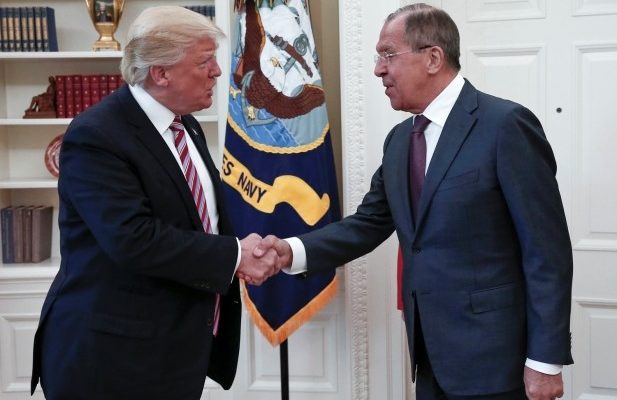Trump reportedly shared classified and highly sensitive intelligence with visiting Russian officials.
The White House faces another crisis since a report on Monday in the Washington Post revealed that President Donald Trump had shared classified, highly sensitive intelligence with visiting Russian officials at the Oval Office last week.
The report prompted another round of frantic scenes just days after Trump’s decision to fire FBI director James Comey sent his communications team into a tizzy.
White House officials denied the story in several statements, including a 45-second, on-camera statement delivered by Trump’s national security adviser H.R. McMaster.
“I was in the room, it didn’t happen,” McMaster told reporters.
“The president and the foreign minister reviewed a range of common threats to our two countries, including threats to civil aviation,” McMaster said. “At no time, at no time were intelligence sources or methods discussed, and the president did not disclose any military operations that were not already publicly known.”
Earlier on Monday, Deputy National Security Advisor Dina Powell echoed McMaster. “This story is false. The president only discussed common threats that both countries faced,” Powell said.
According to Secretary of State Rex Tillerson, “sources, methods or military operations” were excluded from the conversation.
The Post cited current US officials who said Trump shared classified details with Russian Foreign Minister Sergei Lavrov and Russian Ambassador to the US Sergey Kislyak. They said the information, which had been provided by a US partner through an intelligence-sharing arrangement, was considered so sensitive that details have been withheld from allies and tightly restricted, even within the US government.
Trump: ‘I Wanted to Share with Russia’
The information reportedly originated from a “Middle Eastern ally” and pertained to an Islamic State (ISIS) terror plot related to the use of laptop computers on aircraft, putting a source of intelligence about ISIS at risk. The partner had not given the US permission to share the material with Russia.
The Post story did not claim that Trump revealed any specific information about how the intelligence was gathered, as McMaster’s denial suggested.
Officials refused to answer specific questions, including where precisely the report erred.
Meanwhile, on Tuesday morning Trump tweeted, “As President I wanted to share with Russia (at an openly scheduled W.H. meeting) which I have the absolute right to do, facts pertaining to terrorism and airline flight safety.”
As president, Trump has the authority to declassify information.
The disclosure late Monday drew strong condemnation from Democrats and a rare rebuke of Trump from some Republican lawmakers.
Sen. Bob Corker (R-TN) said he would rather comment on the report after “I know a little bit more about it,” but added, “Obviously, they are in a downward spiral right now and have got to figure out a way to come to grips with all that’s happening. And the shame of it is, there’s a really good national security team in place.”
Corker also said, “The chaos that is being created by the lack of discipline is creating an environment that I think makes — it creates a worrisome environment.”
Russia’s foreign ministry spokesman denied the report.
Maria Zakharova, spokeswoman for the Russian foreign ministry, in a Facebook post, described the reports as “yet another fake.”
The report came several days after the White House faced criticism for a possible security breach after it allowed a Russian news service photographer into the Oval Office to snap photos of the meeting.
By: World Israel News Staff
AP contributed to this report.





